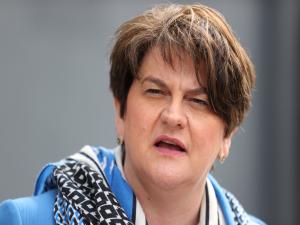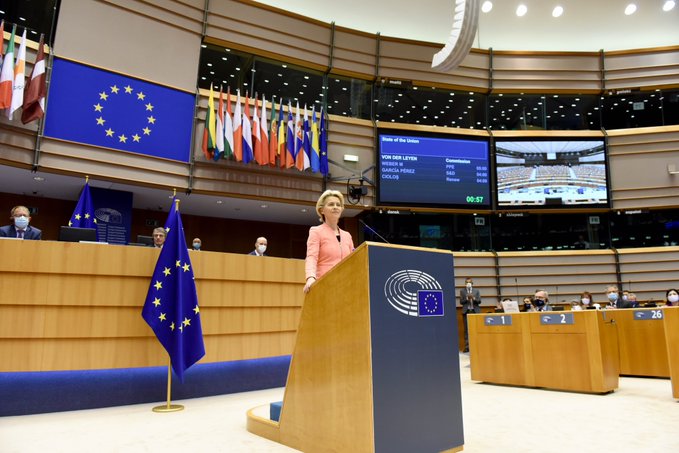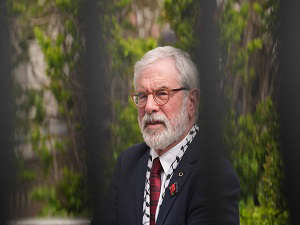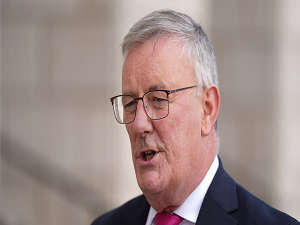
By Jonathan McCambridge and Alexander Britton, PA
First Minister Arlene Foster has accused the EU of having a “tin ear” to concerns about the Northern Ireland Protocol.
Mrs Foster was speaking after European Commission president Ursula von der Leyen said the protocol needs to be implemented.
A new raft of checks on goods at the ports of Belfast and Larne under the terms of the protocol have sparked anger among unionists and loyalists who feel Northern Ireland is being separated from the rest of the UK.
While talks are continuing between the EU and the UK Government to solve some of the issues linked to the protocol, outgoing DUP leader Mrs Foster and her successor Edwin Poots have insisted it must be scrapped.
Following a visit to a school in Craigavon on Tuesday, Mrs Foster told the PA news agency the UK Government must act to ensure free movement of trade with Northern Ireland.
Responding to Mrs von der Leyen’s remarks, she said: “I think it is hugely disappointing, in spite of everything that has happened, the fact that we are talking about cancer drugs being prevented from coming into Northern Ireland.
“The fact that there are more checks from Great Britain into Northern Ireland than there are in Rotterdam; that still the European Union and the European Commission have had a tin ear to the concerns and the absolutely genuine concerns of the people in Northern Ireland.
“I would urge our own Government to act in relation to this issue because the United Kingdom as a sovereign entity has a right to have trade moving freely between the different parts and therefore that has to take place.”

EU President Ursula von der Leyen
Recent tensions in Northern Ireland are a result of Brexit itself rather than the protocol introduced after the UK left the EU, Ms von der Leyen said.
She was speaking following the first day of the EU Council – the first such meeting since the introduction of the EU-UK trade and co-operation agreement at the beginning of May.
Ms von der Leyen said: “The beginnings are not easy, tensions are being felt around the access, for example, of EU fishing boats, or tensions are without any doubt there around the implementation of the protocol of Northern Ireland.
“And I think it is important to reiterate that the protocol is the only possible solution to ensure peace and stability in Northern Ireland while protecting the integrity of the European Union’s single market.
“If we see problems today we should not forget that they do not come from the protocol but they result from Brexit. That is the reason why the problems are there.
“Now, it’s our common duty with the United Kingdom to do whatever we can to reduce tensions in Northern Ireland and that is why we are exploring practical solutions to help to minimise the disruptions to the everyday life in Northern Ireland.”


 Gerry Adams awarded 100,000 euro in damages after suing BBC for libel
Gerry Adams awarded 100,000 euro in damages after suing BBC for libel
 Victim held in room while masked men ransack Saintfield home
Victim held in room while masked men ransack Saintfield home
 Nesbitt not surprised if ‘devastating’ culture in RVH report repeated elsewhere
Nesbitt not surprised if ‘devastating’ culture in RVH report repeated elsewhere
 Pensioner, 82, killed in crash near Omagh
Pensioner, 82, killed in crash near Omagh
 Kneecap announce new song ahead of headline performance at London’s Wide Awake
Kneecap announce new song ahead of headline performance at London’s Wide Awake